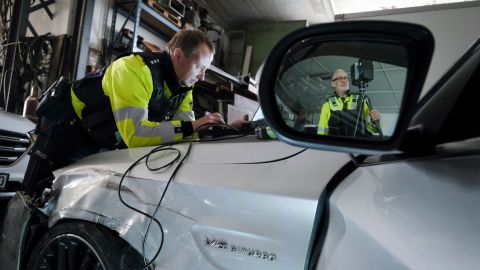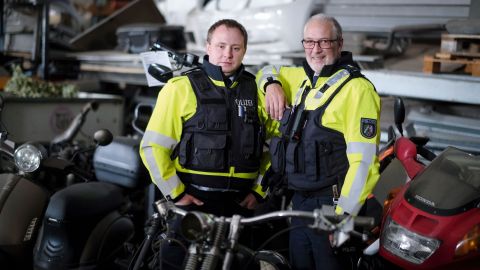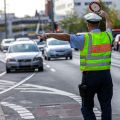The car has a sense of humor. "Top up wiper fluid!" is written brightly on the dashboard. Of course, a lack of wiper fluid is probably the least of the car's problems. The Mercedes in fake high-performance AMG trim no longer drives. The front left tire is flat, the side is dented, the rear fender is torn off. A major loss.
The car is parked in the hall of a car recycler in Bochum. In the neighborhood: car dealer, car parts dealer, car pawnshop, car expert, towing service. This is a place for screwing and hammering, a humming horsepower scene.
The traffic accident happened just around the corner in the industrial estate. The AMG-look Mercedes and a Hyundai Tucson collided. The Hyundai is also at the recycler. The right rear wheel is torn off. A case for the police specialists. "Both say the other was looking at their cell phone," reports Chief Superintendent Patrick König. He is part of the traffic accident investigation team at Bochum police headquarters.
He uses a laptop to try and read the Mercedes' data from the memory of the airbag control unit. Information on speed, gas pedal and brake position, assistance system data and the steering wheel's turning angle are used to reconstruct the exact course of the accident. The cell phones can also be seized or confiscated as evidence in order to obtain further information about cell phone use.
Police Chief Inspector Tom Wenzel takes measurements with the 3D scanner. This information is used to compare the current condition of the car with the original dimensions and also to obtain information about the force and angle of the impact. High-tech in everyday police work. "The technology we have acquired in recent years is like an explosion," says König.
The police are "facing the particular challenge of increasing digitalization and automation of road traffic," according to the Ministry of the Interior. The assistance systems in modern cars mean that the classic trace pattern, for example braking and blocking lanes, is often no longer found at the scene of an accident. Special technology and specialized personnel are required to secure not only the classic but also the digital traces in such a way that they can also be used in court.
17 accident investigation teams will be introduced throughout North Rhine-Westphalia over a period of three years until 2023. "What forensics is at a crime scene, the accident team will be at an accident scene throughout the state in future," says Interior Minister Herbert Reul. This will cost a lot of money, even though some authorities are already equipped with 3D laser scanners, drones, devices for securing digital vehicle tracks and high tripods. According to a rough calculation, the value of the equipment for an accident team and accident recording vehicle is around 330,000 euros.
The Bochum team carries out up to 250 operations per year. A particularly serious accident recently occurred on Wasserstrasse. A driver lost control of his vehicle at a speed of over 100 km/h (in urban areas!) and crashed into a row of parked cars. Possibly the result of a race.
Or the example of Hagen: twelve people were injured, four of them seriously, in a sensational accident involving a coach, a bus, a lorry and several cars. Another case for the accident team.
When the teams are deployed is precisely defined: in accidents with fatalities, with serious injuries where there is a risk to life and with personal injuries after illegal races, in hit-and-run accidents with personal injuries, if the evidence requires special technology, or in traffic accidents of particular public interest.
The first accident team started in Cologne in 2004/05. Bochum has been active since 2007. In addition to police officers, Wenzel's 14-strong team there also includes three surveying technicians as government employees who contribute their special expertise. "We need to move away from generalists to specialists," is the strategy from the Ministry of the Interior. The quality of traffic accident recording is also high, and in future not everyone will be able to do everything.
The Bochum-based team has gained a wealth of experience over the years. "But we haven't reinvented the wheel here either," emphasizes Wenzel. The exchange with neighboring authorities and the scientific community is therefore very important to him. "We are still learning every day."


